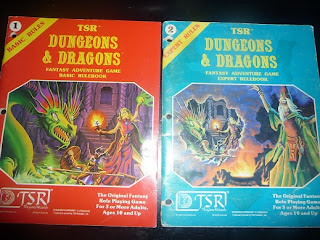I've always felt that D&D was actually two games in one: the one you read in the books, modules and supplements, and the one you play at the table. The former is complex, full of awesome rules that can be put to paper and make even your math major friend's head spin a little. "This" game of D&D is meant for grognards and students of the game who love to discuss, debate (often hotly) on message boards, blogs and forums. More power to you if you're into that.
The second type of D&D, in my experience, is the one that actually gets played, at least for good, honest fun. I've tried for years to put all those great rules into my games and have utterly failed 99.9% of the time. Table-top D&D is all about enjoying the company of friends, telling great stories, and relaxing. If you're lacking in one of those areas at your games, you may be trying to hard to play "book" D&D. While I love the presentation in AD&D the most, Basic D&D accomplishes the table game far better.
But why not the OD&D brown books, Holmes or even Mentzer D&D? First of all, my complaints of these editions are very minor. I'll gladly sit down and play for a DM who wants to run them. They all have the same general spirit that I'm looking for, but minor quirks keep me from making my "goto" game.
For me, OD&D is a mess, even with its retroclones cleaning it up. When most of the rules offer optional secondary rules, I start wondering what game I am actually playing. Add to that my gamer ADD and I can never feel completely comfortable with one "option". OD&D with the four supplements just feels like AD&D to me. If I'm going to play AD&D, I'll play the real thing.
My problem with Holmes and Mentzer is more presentation than anything else. Moldvay's art is superior for me, and in the case of Holmes, I have a real problem with how the game came about. It was a hackneyed approach that was completely unplanned while Gygax worked on AD&D that always leaves me with a bad taste in my mouth. Oh and I dislike non-variable weapon damage, but I'll get into that in a later post. Mentzer is a great edition, but here we start to feel the oncoming Silver Age starting to creep in. Things start to feel a little -too- organized and quantified at this point. The story layout was original, but it was also a little jarring to me. The supplements totally ruined the spirit of the game as well, I feel, with ultra-epic levels, etc. Cool, but that's just not for me.
So here I am with Moldvay Basic/Expert. What do I love about it?
1. Layout
There has never been an edition of D&D that made character creation so simple. Everything is laid out step-by-step on one page. Doing this was absolutely brilliant and something that was never done again quite so well for a complete edition of the game. Tables and stat blocks were also beautifully done, monster stats were extremely easy to read and left a lot for imagination.
2. Style
Modern D&D is to Lord of the Rings as Basic D&D is to The Hobbit. It's really true if you think it through a bit. I could go through all the reasons, but I'll state the most obvious: race as class. Once I became converted to this thinking, I could never go back. "Gold = Experience" is also a tribute to the days of fantasy literature before some sort of Dark Lord needed to be slain and heroes were just out to get rich and have adventures. Elfs, not Elves, and Dwarfs, not Dwarves is also a way to sum up how fantasy creatures were handled in Basic. Magic is more magical, monsters are more monstrous, and men are more mundane in Basic.
2. Playability
The game plays wonderfully. The game is a beautiful balance between player and character skill, in contrast to modern games where character skill always rules the day. Actions need to be vocalized in depth most of the time and the DM has complete control over the action. He is not merely a referree or a rules lawyer, but a builder of magical worlds.
I'd love to touch on these in far more detail at a later time, but for now suffice it to say: Moldvay's edition is the game of D&D that was meant to be played. Period...unless you're like me and you like to keep your books nice. ;)
When I sit down at the table I just bring Labyrinth Lord. It's, in my opinion, the best retro clone ever made. It's extremely close to the original rules, with just a few minor changes. I actually printed my copy at Kinkos and put into a nice spiral bound booklet for space saving at the table. In addition to Labyrinth Lord, I also have a printed, spiral-bound copy of The Old School Encounter Reference #4, and my thick DM notebook. That's about it.
With this set of books I focus the vast majority of game time world building through pure, undistilled, adventure.


No comments:
Post a Comment